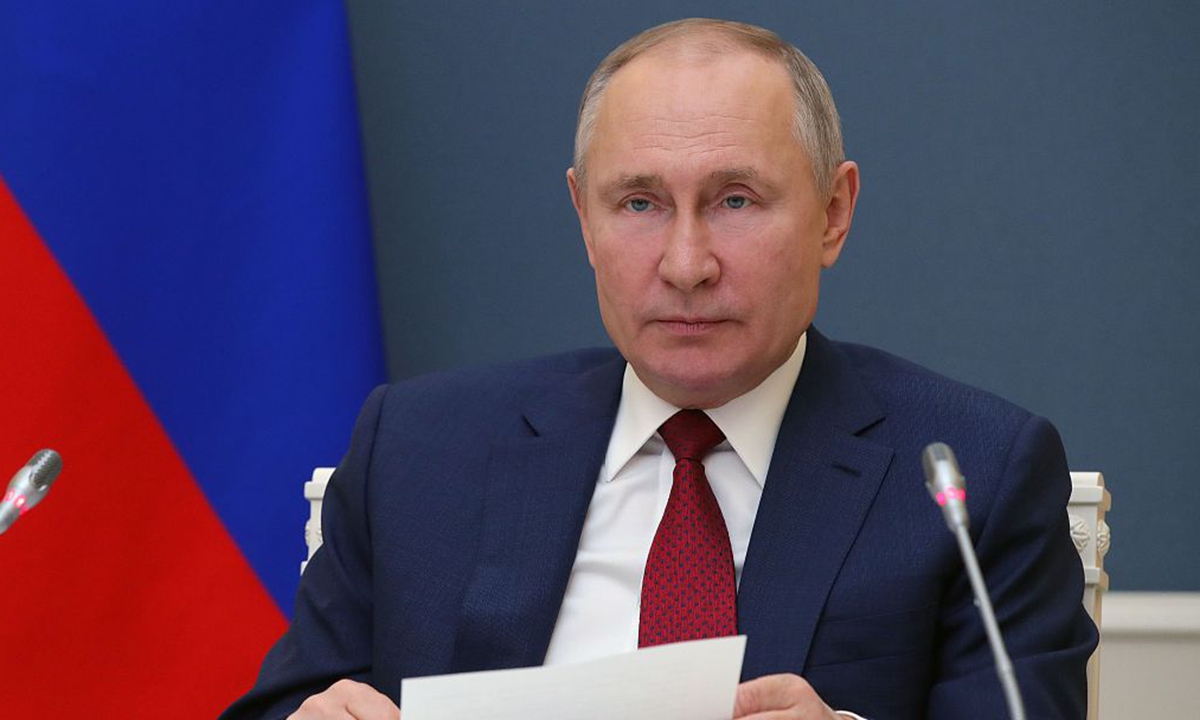Putin saying no to 'China threat theory' shows his grand wisdom: Global Times editorial

Photo:VCG
Russian President Vladimir Putin refuted on Tuesday during a videoconference the "China threat theory" from various angles. He said Russia is not worried about the topics hyped by the West, such as China's growing military strength, including the development of hypersonic weapons, and modernizing its nuclear arsenal. Putin believes China has the right to do so. He also praised the "unprecedentedly high level of bilateral ties" between China and Russia, noting Russia will not adjust its China policy based on the interests of a third party.
Putin's remarks have echoed positively in China. It is believed that Putin's resolute attitude toward China has a wide popular base in Russia. It is fortunate for both countries and the world that China and Russia are cooperating at the best level of their relationship in history. As Putin put it, China-Russia relations are vital to keeping world peace and stability.
In recent years, many forces in the US and the West want to drive a wedge between China and Russia. They have focused on Moscow in an attempt to make a breakthrough from it. In the eyes of those forces, China and its power are growing rapidly, and since China and Russia are land neighbors with long national borders and complex historical relations, Moscow's strategic doubts about Beijing can be ignited easily. But these forces have failed every time.
The strategic guidance of the Chinese and Russian heads of state has played its due role in the stable development of the mutual relations. So has Moscow's strategic sobriety. The US and the West have never been truly friendly to Russia since the end of the Cold War. They have always regarded Russia as an outsider and have a strategic goal of further weakening it. They are full of their insidious and selfish calculations when trying to inculcate in Russia the "China threat theory." They are trying to replace Russia's strategic cooperation with China with mutual strategic attrition between the two countries.
The US' approaches to containing both Russia and China are very similar: To incite as many neighboring countries as possible to confront the two countries. As for relations between Beijing and Moscow, Washington wants to pit the two countries against each other.
It is way too easy to find a reason for Asian countries as well as for China and Russia to confront each other: It could simply take the sovereignty dispute over a small island. And there are many disputes in history, too. For example, it is Japan that has historically invaded China, but now it says it feels strongly about the "China threat." China has advocated shelving differences over the Diaoyu Islands, but Japan just did not want to do so, resulting in the issue on the islands being turned into the focus in the bilateral relations.
Moscow has firmly rejected the "China threat theory," while being open and frank with Beijing. This has made the two countries "not allies but better than allies" in a complex international environment and led to a huge gain in national interests of both countries. The demonstration of China-Russia relations is at the same time the best negation of the "China threat theory."
Some say that even though some countries in the region are dancing to the tune of the "China threat theory" and have suffered losses in the direction of China, they have been compensated for their interests in the direction of the US. We would like to point out that such a calculation is wrong. For instance, Japan has lost its strategic leverage against the US precisely because of its opposition to China. Now, it can only deepen its dependence on the US.
At a time when China is already the No.1 trading partner of almost all regional countries, it is no longer possible for the US to compensate those who are in a bad relationship with China. All those verbal approvals and promised security guarantees can bring nothing but psychological comfort, and whoever confronts China will only suffer the consequences. The result of the confrontation with Russia is the same.
No matter where the "China threat theory" is hyped, it will be poisonous. The DNA of Chinese civilization is not aggressive, never. One must have been misled if he feels a "threat" rather than an opportunity from a powerful China, especially when his sense of being threatened is deep-rooted. If one walks down the path paved by the "China threat theory," he is bound to suffer losses.
Putin has displayed his grand wisdom by not accepting this hype of "China threat." Russia has extremely rich geopolitical experience, and its denial of such a "theory" is worth further thought and calculation.
